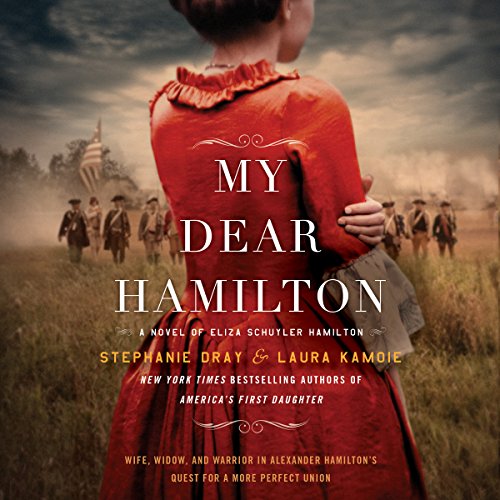My Dear Hamilton
ISBN: 978-0062466167 
Remember about six years ago or so when suddenly everyone seemed to be an expert on Alexander Hamilton due to the release of the musical Hamilton? America seems to lag when it comes to reading history, but if someone makes a catchy, annoying musical that is quasi-historical, everyone is suddenly invested. My Dear Mr. Hamilton came out during this period. As a work of historical fiction, one expects it to be partly true, and partly contrived. On these points, there is nothing especially surprising about the work.
The problem, as noted in other reviews here at The Book Light, with historical fiction about this era of history is that the modern lens simply cannot resist interpreting what was written then through a modern mindset. Hence, Eliza Schuyler, the person whose perspective this book is written from, is actually the brains behind Hamilton and Mr. Hamilton just does not heed her advice, and so she has to deal with her “brilliant but not as smart as she is” husband. If this sounds to you like the plot of just about any sitcom from the last 20 years or so I suspect that you will discover that the overlap owes more to the modern convention than the historical fact.
Just to add another layer of modern pretense, we also get to play the “Which-founding-fathers-of-America-were-also-actually-Sodomites” take-home party game. It certainly is not the case that people were abstaining from practicing sodomy in any given time period (they simply kept it secret)–the issue however is the modern obsession with anytime one sees the word “love” written in a letter between two men of other eras the automatic conclusion is that they must have been engaged in a steamy, secret, forbidden, homosexual affair. That Hamilton was in an extra-marital affair and was blackmailed for it is factual. That this affair damaged Elizabeth Schuyler’s estimation of her husband is clear because she left him to go to her parents for some time. She eventually returned, however, and their marriage produced two more children for a total of something like eight complete children. This is not a marriage where a lack of intimacy was the norm.
To be clear, it is not to say the Elizabeth Hamilton is “less smart” than her husband. If anything, she is probably “as smart” in some other complementary way. It also is not the case that Hamilton could not have had a homosexual relationship. It is the case, however, that what commonly happened in the “old days” where marriages were concerned was that mistakes were made and most puzzling to the modern mindset actually also forgiven and moved beyond. My Dear Hamilton would have us believe that Eliza “Betsy” was simply a woman who was hurt and harbored longstanding grudges and eventually wound up rather poor after the death of Hamilton in a duel though she also started one of the first orphanages. In addition, she also started a “free school” to offer free education as well. Her main reason for doing these things was because she believed that all children should be literate enough such that they could read the Bible and study it. This is not a “bitter woman” response but rather a woman committed to Biblical values including marriage and her husband’s–imperfect though he might be–legacy. Likewise, when two men say the word “love” in the early history of America, it most often meant “brotherly”–something largely forgotten and not practiced here in contemporary times.
Modern literature with “feminist leans” and sneaky agendas completely miss these very obvious Judeo-Christian underpinnings and can only interpret in light of modern, unrestrained desires. No wonder terrible musicals have become the norm. When a people only want to relate to history as some kind of entertaining joke, it can only mean those people have themselves become jokes.
